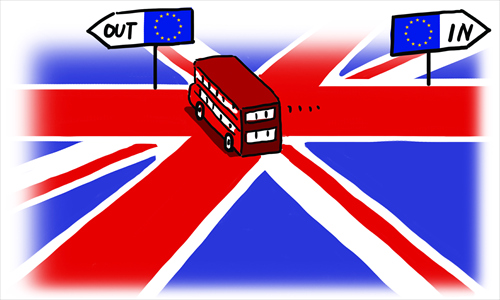Brexit causes a legitimacy crisis for European bloc

Illustration: Liu Rui/GT
The Brexit referendum ended Friday, with the Leave side winning with 51.9 percent, versus the Remain side's 48.1 percent. British Prime Minister David Cameron announced he would step down by October. Now when Britain will exit the EU hinges on the UK Parliament and the EU. If the EU doesn't want to prolong Brexit negotiations, Britain will withdraw from the bloc soon. Should the EU trigger Article 50 of the Treaty on the EU, then the suspense will not be short-lived. Regarding other issues such as whether other EU members would follow suit, the possibility of a second independence referendum of Scotland, and changes to the global order, there are many uncertainties ahead.
Despite varied speculations over the referendum, most scholars are disappointed with the result. The referendum is an embodiment of the public's revolt against the elite. Western democracy in essence is about representative democracy. By employing a referendum, the Cameron government opened a window of opportunity for direct democracy. It's not a wise decision, as it provides a hotbed for populism.
In regard to the EU, it is facing a legitimacy crisis with member states and the public not accepting the bloc as a legitimate and effective mechanism to fulfill their requirements.
The Brexit referendum reflects Britain's desire for a special status in the EU. This is nothing new. The UK has never been fully integrated into the bloc, especially when it comes to currency and free movement of people. Britain has never played an active role in the process of the European integration. The Brexit is more symbolic than substantive.
In a statement after the vote, US President Barack Obama stressed the endurance of a special relationship between the US and the UK, claiming that "the UK's membership in NATO remains a vital cornerstone of US foreign, security, and economic policy."
Washington also emphasized that its cooperation with the EU on various economic and political matters will continue. This reflects that the US consistently pursues an offshore balancing strategy in Europe.
Russian President Vladimir Putin says the referendum result reflected the dissatisfaction of the British people with Europe. He also said Russia did not interfere in the referendum. But noticeably, Brexit could provide Russia buffer time to deal with sanctions imposed by the US and Europe and the upcoming NATO Summit, which is scheduled on July 8-9 in Warsaw.
After the UK voted to leave the EU, Chinese Foreign Ministry Spokeswoman Hua Chunying said China respects the choice of the British people.
This, for one thing, demonstrates China's policy of not intervening in other countries' domestic affairs, and for another thing, indicates that China's dual track diplomacy with the UK and the EU won't be greatly impacted by the Brexit.
However, in light of the interdependence between financial market and global trade, China needs to prepare for fluctuations in the financial market and mull future economic and trade cooperation with the UK and EU. It should also work out countermeasures with a cool head to ensure the steady development of China and the rest of the world.
In the long run, if the UK and EU fall into a disorder, the Western world will have to reflect on liberal democracy and social Darwinism, both of which have been exemplified as pillars of their society.
Given Brexit's influence on geopolitical landscape in Europe, the role of NATO will be highlighted. Besides, the trends of radical thought, including populist as well as far-left and far-right ideas, are bound to influence the global political ecology.
The author is an associate research fellow at the Institute of European Studies, Chinese Academy of Social Sciences. opinion@globaltimes.com.cn